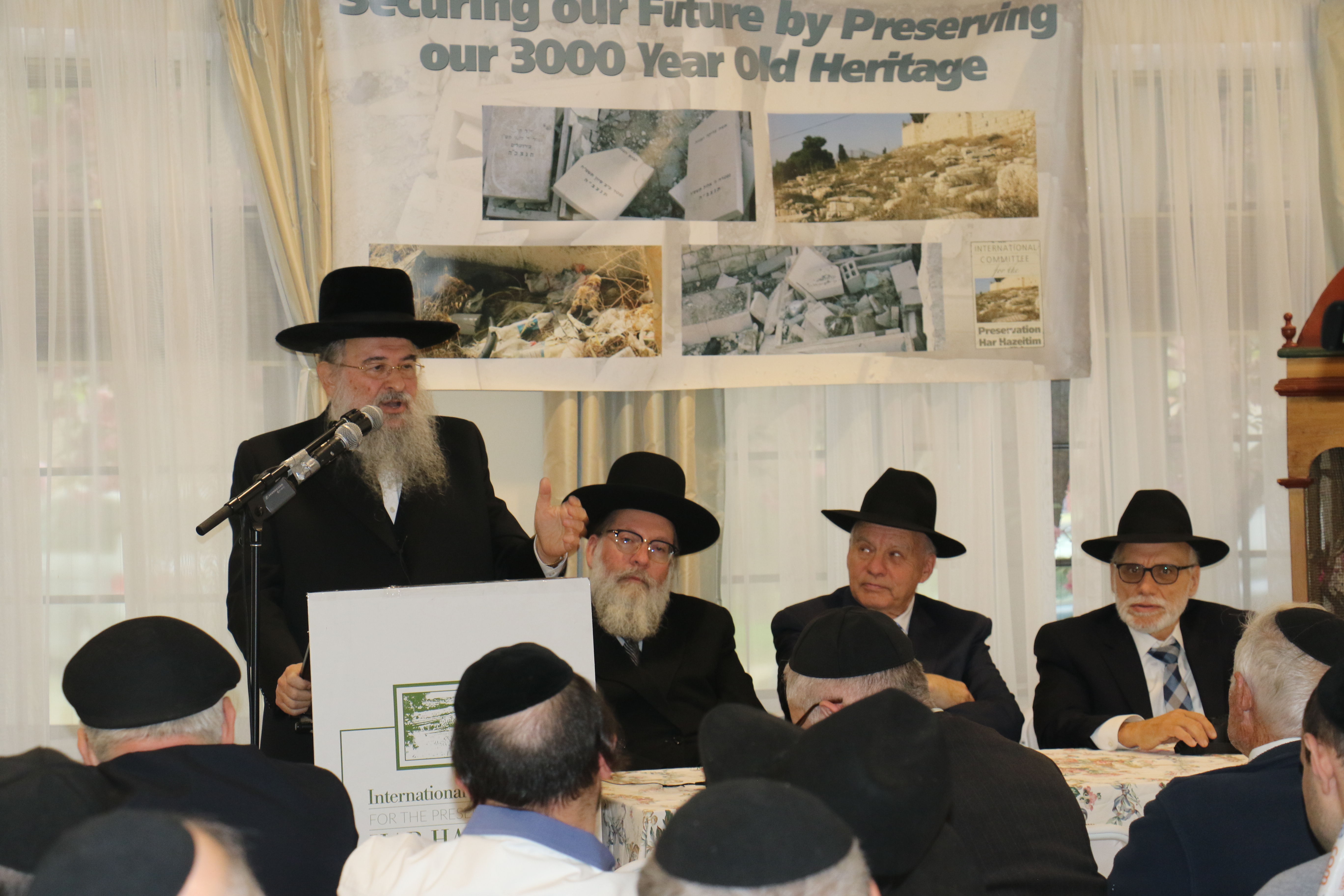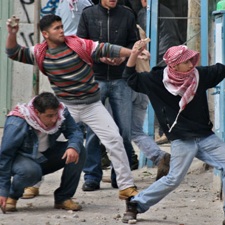
“The neshomos buried on Har Hazeisim must not be given an opportunity to speak ill of us because of our apathy and inaction,” said Harav Noach Isaac Oelbaum, Moroh D’Asroh of Khal Nachlas Yitzchok in Queens. In a fiery speech at the annual Flatbush breakfast for Har Hazeisim on May 6th, Harav Oelbaum invoked the edict of the Chasam Sofer that every cemetery and even areas designated for Jewish burial must be surrounded by a wall or fence. “It is not enough to say ksiva vechasima tova on Rosh Hashanah when not enough is done for the shochnei afar who may very well not advocate for us because of our inaction on their behalf,” said Harav Oelbaum.
An impressive group of community activists joined the annual breakfast at the home of Mr. and Mrs. Michael Gelernter. Also in attendance was Harav Yosef Frankel, the Vyelipoler Rav, a member of the Moetzes Gedolei Hatorah of Agudas Yisroel, and a host of local rabbonim. The event is to support the efforts of the International Committee for Har Hazeisim, chaired by Avrohom Lubinsky. His brother Menachem, a well-known askan and President of Lubicom joined Rabbi Chaim Dovid Zwiebel, the Executive Vice President of Agudath Israel of America, in co-hosting the event.
Harav Moshe Tuvia Lieff, the Moroh D’Asroh of Agudas Yisroel Bais Binyomin, who has hosted these events since 2014, called the desecration of Har Hazeisim in previous years “a national disgrace.” He added: “Who could imagine donkey races, graves used as a soccer posts, and garbage strewn everywhere in any national cemetery?” He recalled the many Gedolei Yisroel and even Chief Rabbi Dovid Lau who wondered out loud at previous breakfasts he hosted “why it took two brothers from Brooklyn to wake up the Jewish conscience.”
Mr. Lubinsky reported on recent upgrades in security including the construction of permanent shelter for the border police, additional cameras, and a great deal of effort by the police in the nearby Arab neighborhoods. Mr. Lubinsky used the opportunity to criticize plans to offer autonomy to several nearby neighborhoods such as Jebl Mukabar, Isawiya, Shuafat and Abu Dis. “A major reason for our success has been the unrestricted access by the security forces to the neighboring Arab communities. Any plans by the Trump Administration to offer these communities autonomy may restrict access by the security forces.” Mr. Lubinskly added: “We dare not let our guard down for even one moment and risk a return to the national shame of abuse and neglect that we experienced prior to the formation of our committee.”
Har Hazeisim, which overlooks the Har Habayis, is the oldest surviving Jewish cemetery in the world, dating back over 3,000 years and is the resting place for over 150,000 Jews, including the foremost leaders of our nation dating back to the nevi’im. Despite being in Israeli hands, the cemetery remained largely neglected until May 2010 when Israel’s State Controller Micha Lindenstrauss issued a stinging report on the neglect and abuse of the mokom kodosh. He blamed successive Israeli governments for virtually neglecting the cemetery. This shocking report prompted Avrohom Lubinsky, a Brooklyn NY businessman, to create the International Committee for the Preservation of Har Hazeisim.
The Committee has thus far managed to persuade the Israeli authorities to install 171 surveillance cameras in addition to a 24/7 Command Center. After extensive lobbying at the highest level of government, a police substation was finally established in March 2012. The police station has been a major deterrent to the criminal activity by Arab youths. In addition, a unit of the Border Patrol maintains a constant vigil and are now housed in a permanent structure, thanks to the courtesy of a benefactor. The Committee was also instrumental in the construction of a fence around the Eastern sector of the cemetery, an area that was the target of much violence in the past. Thanks to the efforts of the ICHH, there have been no destroyed graves in two years, security has vastly improved, and there was much improvement to the maintenance and cleanliness of the cemetery.
In a historic development, 67 members of the Knesset responded to an invitation by Speaker Yuli Edelstein to join a caucus on Har Hazeisim. Headed by MK Yoav ben Zur (Shas), the caucus is the largest in the history of Har Hazeisim.
The biggest proof of the dramatic changes on Har Hazeisim is that the average daily number of visitors is now well over 2,000 when in 2015 it was under 200. But the ICHH is committed to assure the safety of visitors travelling through the access roads, to continuing to upgrade the infrastructure, restore some 35,000 graves, and build a Visitor Educational Center.




